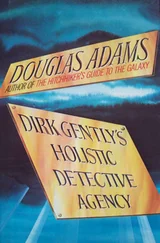The words were Setswana words, but one had to strain to understand them. This was a man who spoke in the clicks and whistles of the Kalahari.
"Where is the boy?" snapped the woman.
"That side," replied the man. "Look."
And then they saw the boy, standing beside a bush, watching them uncertainly. A dusty little boy, in torn pants, with a stick in his hand.
"Come here," called the witch doctor's wife. "Come here."
The boy walked over to them, his eyes fixed on the ground in front of him. He had a scar on his forearm, a thick weal, and Mma Ramotswe knew immediately what had caused it. That was the cut of a whip, a sjambok.
She reached forward and laid a hand on his shoulder.
"What is your name?" she asked gently. "Are you the teacher's son from Katsana Village?"
The boy shivered, but he saw the concern in her eyes and he spoke.
"I am that boy. I am working here now. These people are making me look after the cattle."
"And did this man strike you?" whispered Mma Ramotswe. "Did he?"
"All the time," said the boy. "He said that if I ran away he would find me in the bush and put a sharpened stick through me."
"You are safe now," said Mma Ramotswe. "You are coming with me. Right now. Just walk in front of me. I will look after you."
The boy glanced at the Basarwa and began to move towards the van.
"Go on," said Mma Ramotswe. "I am coming too."
She put him in the passenger seat and closed the door. The witch doctor's wife called out.
"Wait a few minutes. I want to talk to these people about the cattle. Then we can go."
Mma Ramotswe moved round to the driver's door and let herself in.
"Wait," called the woman. "I am not going to be long."
Mma Ramotswe leaned forward and started the engine. Then, slipping the van into gear, she spun the wheel and pressed her foot on the accelerator. The woman shouted out and began to run after the van, but the dust cloud soon obscured her and she tripped and fell.
Mma Ramotswe turned to the boy, who was looking frightened and confused beside her.
"I am taking you home now," she said. "It will be a long journey and I think we shall have to stop for the night quite soon. But we will set off again in the morning and then it should not be too long."
She stopped the van an hour later, beside a dry riverbed. They were completely alone, with not even a fire from a remote cattle post to break the darkness of the night. Only the starlight fell on them, an attenuated, silver light, falling on the sleeping figure of the boy, wrapped in a sack which she had in the back of the van, his head upon her arm, his breathing regular, his hand resting gently in hers, and Mma Ramotswe herself, whose eyes were open, looking up into the night sky until the sheer immensity of it tipped her gently into sleep.
AT KATSANA Village the next day, the schoolmaster looked out of the window of his house and saw a small white van draw up outside. He saw the woman get out and look at his door, and the child-what about the child-was she a parent who was bringing her child to him for some reason?
He went outside and found her at the low wall of his yard. "You are the teacher, Rra?"
"I am the teacher, Mma. Can I do anything for you?" She turned to the van and signalled to the child within. The door opened and his son came out. And the teacher cried out, and ran forward, and stopped and looked at Mma Ramotswe as if for confirmation. She nodded, and he ran forward again, almost stumbling, an unlaced shoe coming off, to seize his son, and hold him, while he shouted wildly, incoherently, for the village and the world to hear his joy.
Mma Ramotswe walked back towards her van, not wanting to intrude upon the intimate moments of reunion. She was crying; for her own child, too-remembering the minute hand that had grasped her own, so briefly, while it tried to hold on to a strange world that was slipping away so quickly. There was so much suffering in Africa that it was tempting just to shrug your shoulders and walk away. But you can't do that, she thought. You just can't.
MR J.L.B. MATEKONI
EVEN A vehicle as reliable as the little white van, which did mile after mile without complaint, could find the dust too much. The tiny white van had been uncomplaining on the trip out to the cattle post, but now, back in town, it was beginning to stutter. It was the dust, she was sure of it.
She telephoned Tlokweng Road Speedy Motors, not intending to bother Mr J.L.B. Matekoni, but the receptionist was out to lunch and he answered. She need not worry, he said. He would come round to look at the little white van the following day, a Saturday, and he might be able to fix it there on the spot, in Zebra Drive.
"I doubt it," said Mma Ramotswe. "It is an old van. It is like an old cow, and I will have to sell it, I suppose."
"You won't," said Mr J.L.B. Matekoni. "Anything can be fixed. Anything."
Even a heart that is broken in two pieces? he thought. Can they fix that? Could Professor Barnard down in Cape Town cure a man whose heart was bleeding, bleeding from loneliness?
MMA RAMOTSWE went shopping that morning. Her Saturday mornings had always been important to her; she went to the supermarket in the Mall and bought her groceries and her vegetables from the women on the pavement outside the chemist's. After that, she went to the President Hotel and drank coffee with her friends; then home, and half a glass of Lion Beer, taken sitting out on the verandah and reading the newspaper. As a private detective, it was important to scour the newspaper and to put the facts away in one's mind. All of it was useful, down to the last line of the politicians' predictable speeches and the church notices. You never knew when some snippet of local knowledge would be useful.
If you asked Mma Ramotswe to give, for instance, the names of convicted diamond smugglers, she could give them to you: Archie Mofobe, Piks Ngube, Molso Mobole, and George Excellence Tambe. She had read the reports of the trials of them all, and knew their sentences. Six years, six years, ten years, and eight months. It had all been reported and filed away.
And who owned the Wait No More Butchery in Old Naledi? Why, Godfrey Potowani, of course. She remembered the photograph in the newspaper of Godfrey standing in front of his lew butchery with the Minister of Agriculture. And why was:he Minister there? Because his wife, Modela, was the cousin of one of the Potowani women who had made that dreadful fuss at the wedding of Stokes Lofinale. That's why. Mma Ramotswe could not understand people who took no interest in all this. How could one live in a town like this and not want to know everybody's business, even if one had no professional reason for doing so?
HE ARRIVED shortly after four, driving up in his blue garage bakkie with tlokweng road speedy motors painted on the side. He was wearing his mechanic's overalls, which were spotlessly clean, and ironed neatly down the creases. She showed him the tiny white van, parked beside the house, and he wheeled out a large jack from the back of his truck.
"I'll make you a cup of tea," she said. "You can drink it while you look at the van."
From the window she watched him. She saw him open the engine compartment and tap at bits and pieces. She saw him climb into the driver's cab and start the motor, which coughed and spluttered and eventually died out. She watched as he removed something from the engine-a large part, from which wires and hoses protruded. That was the heart of the van perhaps; its loyal heart which had beaten so regularly and reliably, but which, ripped out, now looked so vulnerable.
Mr J.L.B. Matekoni moved backwards and forwards between his truck and the van. Two cups of tea were taken out, and then a third, as it was a hot afternoon. Then Mma Ramotswe went into her kitchen and put vegetables into a pot and watered the plants that stood on the back windowsill. Dusk was approaching, and the sky was streaked with gold. This was her favourite time of the day, when the birds went dipping and swooping through the air and the insects of the night started to shriek. In this gentle light, the cattle would be walking home and the fires outside the huts would be crackling and glowing for the evening's cooking.
Читать дальше












